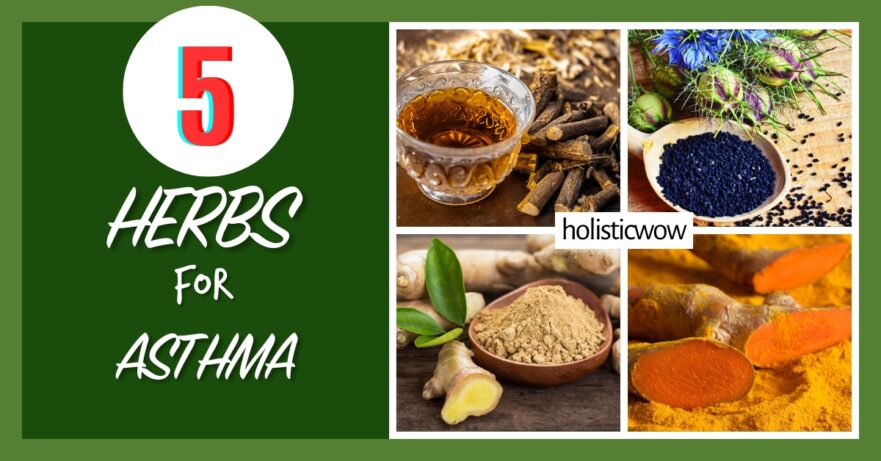In this article about herbs for asthma:
🌿 Best Herbs for Asthma Relief | 📜 Herbal Preparations and Recipes for Asthma Relief | ☯️ Integrating Herbs into Daily Life for Asthma Support | 🌱 Navigating Herbs Safely
Asthma is a chronic lung condition that causes breathing difficulties. It leads to inflammation and narrowing of the airways, resulting in wheezing, coughing, shortness of breath, and chest tightness. These symptoms can significantly impact daily life and overall well-being.
Certain herbs, like black seed, turmeric, and ginger, may help reduce inflammation and ease breathing in asthma. These natural remedies have been used traditionally to support respiratory health and potentially alleviate some asthma symptoms.
This article explores five herbs that show promise in asthma management. We’ll examine their potential benefits, uses, and important considerations for incorporating them safely into your asthma care routine under medical supervision.
Key Takeaways
- 🌿 Herbal Anti-inflammatory Action: Herbs like turmeric and ginger may help reduce airway inflammation associated with asthma symptoms.
- 🫚 Natural Bronchodilation: Some herbs, such as black seed and ginger, have potential bronchodilating effects, which may help relax airway muscles and ease breathing.
- ✨ Complementary Approach: Herbal remedies can complement, but should never replace, conventional asthma treatments like inhalers and medications.
- 🧑⚕️ Medical Supervision Essential: Always consult a healthcare provider before adding herbs to your asthma management plan to ensure safety and avoid potential interactions.
🌿 Best Herbs for Asthma Relief
Asthma is a chronic respiratory condition that affects millions of people worldwide. It causes inflammation, hyperresponsiveness, and narrowing of the airways, leading to breathing difficulties. Common symptoms include wheezing, shortness of breath, chest tightness, and coughing, especially at night or early morning. These symptoms can vary in severity and frequency and are often triggered by factors like allergens, exercise, cold air, viral infections, or stress.
During an asthma attack, the airways become swollen, muscles around the airways tighten, and they produce excess mucus, making breathing difficult. This can result in feelings of panic and distress. While there’s no cure for asthma, various treatments help manage symptoms and prevent attacks.
Several herbs have been traditionally used to support asthma management, including black seed (Nigella sativa), licorice (Glycyrrhiza glabra), turmeric (Curcuma longa), ginger (Zingiber officinale), and peppermint (Mentha piperita). Based on preliminary research, these herbs are believed to have properties that may help ease breathing and reduce inflammation in the airways. However, herbal treatments should not replace conventional asthma management, including inhalers and medications prescribed by healthcare providers.
Black seed (Nigella sativa)
Black seed (Nigella sativa) has been used for centuries in traditional medicine for respiratory conditions, including asthma. The key compound in black seed, thymoquinone, has anti-inflammatory, antioxidant, and bronchodilating properties. Some small-scale studies suggest that these properties may help manage asthma by reducing airway inflammation and relaxing bronchial smooth muscles. Although preliminary research shows potential benefits for improving respiratory function in asthmatic patients, the evidence remains limited. More well-designed human trials are needed to confirm these effects [1]. Nigella sativa extracts have shown promise as a complementary therapy for asthma, with emerging but still inconclusive evidence of their efficacy in respiratory conditions [2].
Licorice (Glycyrrhiza glabra)
Licorice (Glycyrrhiza glabra) has a long history of use in traditional medicine for respiratory issues, including asthma. The primary active component, glycyrrhizin, is well-known for its anti-inflammatory and antioxidant properties, which may help alleviate airway inflammation in asthma patients. Some studies suggest licorice might modulate immune responses, potentially benefiting asthma treatment by reducing inflammation and supporting respiratory function [3]. Additionally, licorice has soothing properties that may help with asthma-related coughing. However, it’s essential to use licorice with caution due to potential side effects like high blood pressure and potassium imbalances, particularly in long-term use. Asthma patients should consult a healthcare provider and use licorice under supervision, especially those with heart or kidney conditions or high blood pressure [4].
Turmeric (Curcuma longa)
Turmeric (Curcuma longa) is well-known for its strong anti-inflammatory properties, which may benefit asthma management. Curcumin, the active compound in turmeric, has shown potential as an add-on therapy for asthma. In a human study, curcumin supplementation improved airway obstruction, as indicated by significant improvements in FEV1 values (forced expiratory volume), and demonstrated a good safety profile with no significant adverse effects [5]. These findings suggest that curcumin may complement standard asthma treatments by helping to reduce symptoms like wheezing and shortness of breath. While curcumin has demonstrated anti-inflammatory properties and a good safety profile in human studies, more clinical research is needed to fully understand its therapeutic role and establish optimal dosages for specific conditions like asthma [6].
Ginger (Zingiber officinale)
Ginger (Zingiber officinale) has been used for centuries to treat respiratory conditions, including asthma. Compounds in ginger, such as gingerols and shogaols, have bronchodilating effects, which may help relax airway smooth muscles and reduce airway hyperresponsiveness in asthma [7]. Preclinical studies suggest that ginger may reduce allergic airway inflammation and could serve as a complementary therapy for asthma management, though more human studies are needed to confirm this [8]. Ginger can be consumed as tea, added to foods, or taken as a supplement. While generally safe in normal dietary amounts, high doses of ginger can interact with blood-thinning medications and may cause heartburn in some people. Pregnant women should consult their healthcare provider before using ginger supplements.
Peppermint (Mentha x piperita)
Peppermint (Mentha x piperita) is commonly used for respiratory relief due to its cooling and soothing properties. Menthol, a key component in peppermint, has been shown to relax the muscles in the respiratory tract, which may help ease breathing difficulties in people with asthma. Inhaling peppermint essential oil may help reduce airway inflammation. One study showed that it can block certain inflammatory processes involved in asthma [9]. While peppermint’s cooling effect provides a feeling of relief, more research is needed to confirm its effectiveness in improving lung function or clearing mucus. Peppermint tea or inhaling essential oil vapors are common ways to use this herb for respiratory conditions. However, peppermint can interact with certain medications, may worsen acid reflux (which can trigger asthma symptoms), and should not be ingested. It should also be used with caution, especially in children.
📜 Herbal Preparations and Recipes for Asthma Relief
To support asthma management, we have developed specific herbal tea and tincture recipes that incorporate the beneficial properties of selected herbs. Each blend aims to ease breathing, reduce inflammation, and provide natural relief for asthma symptoms. These recipes are designed to complement, not replace, conventional asthma treatments. Always consult with your healthcare provider before adding any herbal remedies to your asthma management plan.
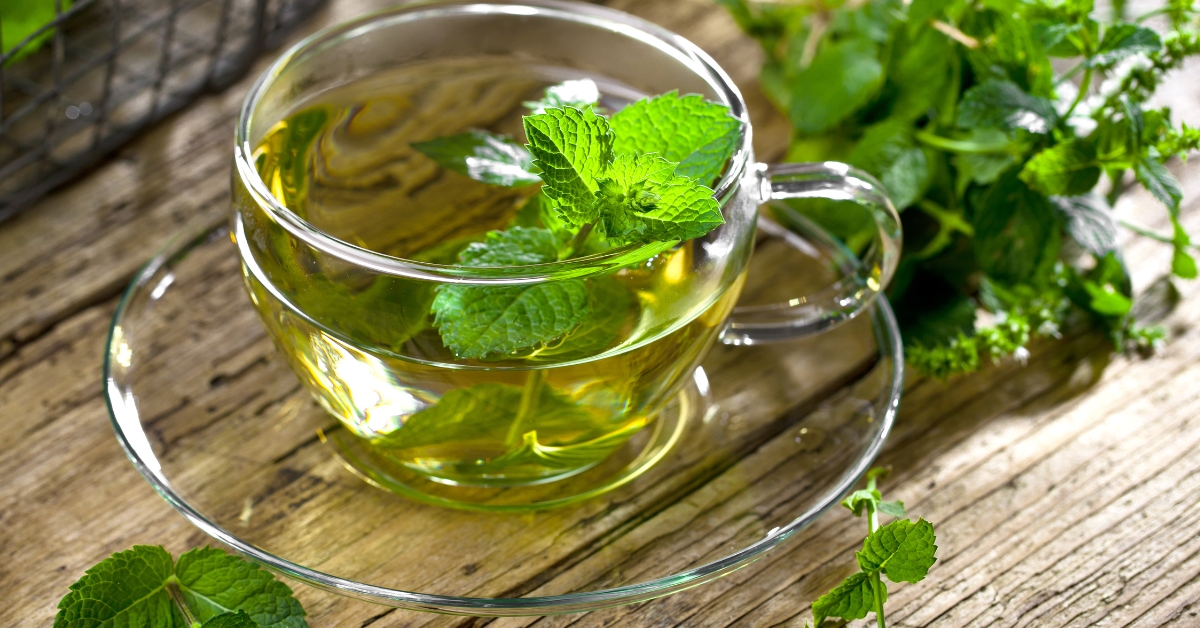
Soothing Breath Tea
Ingredients:
- 1 teaspoon dried peppermint leaves
- 1 teaspoon dried ginger root
- 1 cup of boiling water
Preparation:
- Combine peppermint and ginger in a teapot.
- Add boiling water and steep for 10 minutes.
- Strain and drink once daily to help ease breathing and reduce inflammation.
- Peppermint may worsen acid reflux, which can trigger asthma symptoms in some individuals.
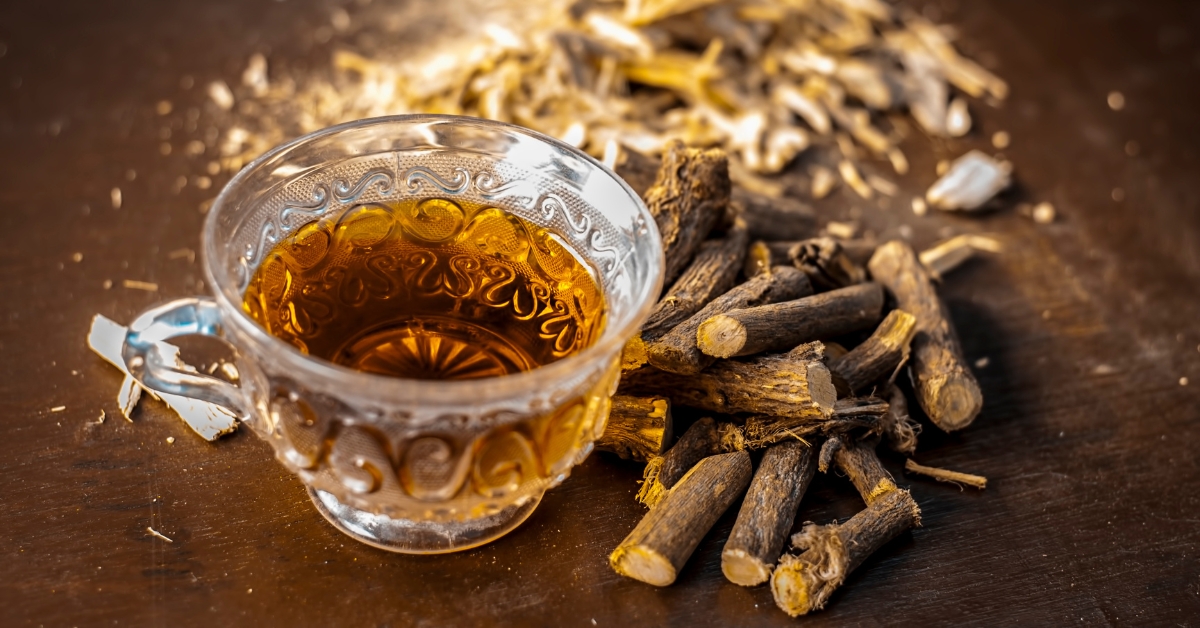
Respiratory Support Blend
Ingredients:
- ½ teaspoon dried licorice root
- ½ teaspoon dried turmeric root
- ½ teaspoon dried ginger root
- 1 cup of boiling water
Preparation:
- Mix all herbs in a teapot.
- Pour boiling water over the herbs and steep for 15 minutes.
- Strain and drink twice daily to support respiratory function and reduce airway inflammation.
- Licorice root may raise blood pressure if used long-term or in high doses.
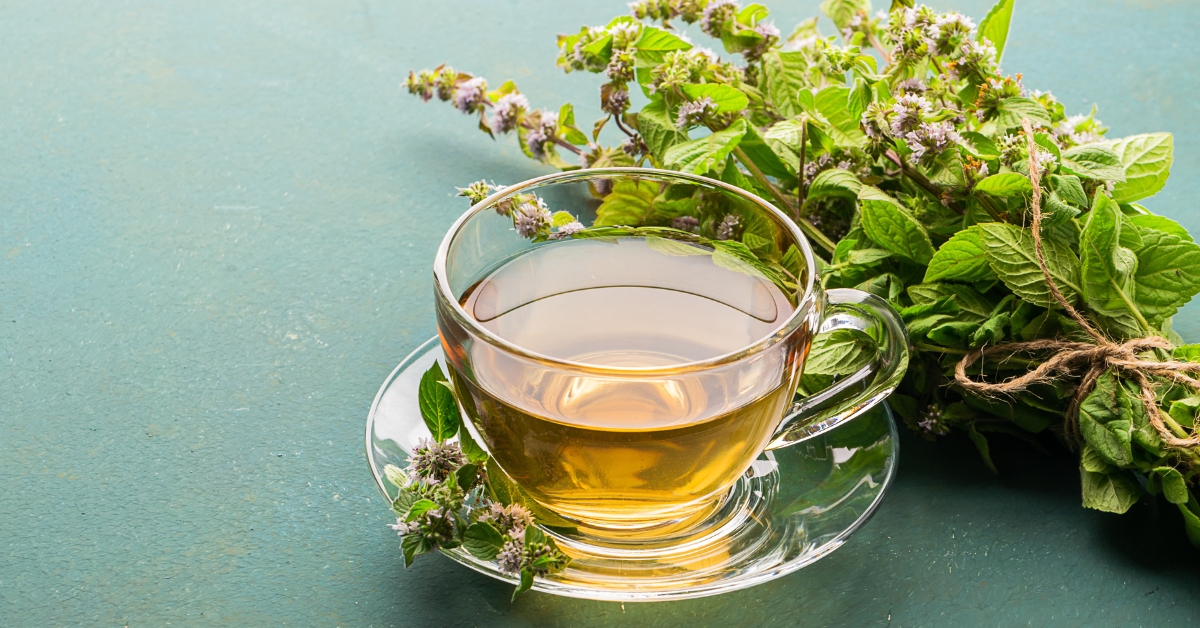
Anti-Inflammatory Asthma Tea
Ingredients:
- 1 teaspoon ground black seeds
- 1 teaspoon dried turmeric root
- ½ teaspoon dried ginger root
- ½ teaspoon dried peppermint leaves
- 1 cup of boiling water
Preparation:
- Combine all ingredients in a teapot.
- Add boiling water and steep for 10-15 minutes.
- Strain and drink once daily to help reduce inflammation and ease asthma symptoms.
- Peppermint may worsen acid reflux, which can trigger asthma symptoms in some individuals.
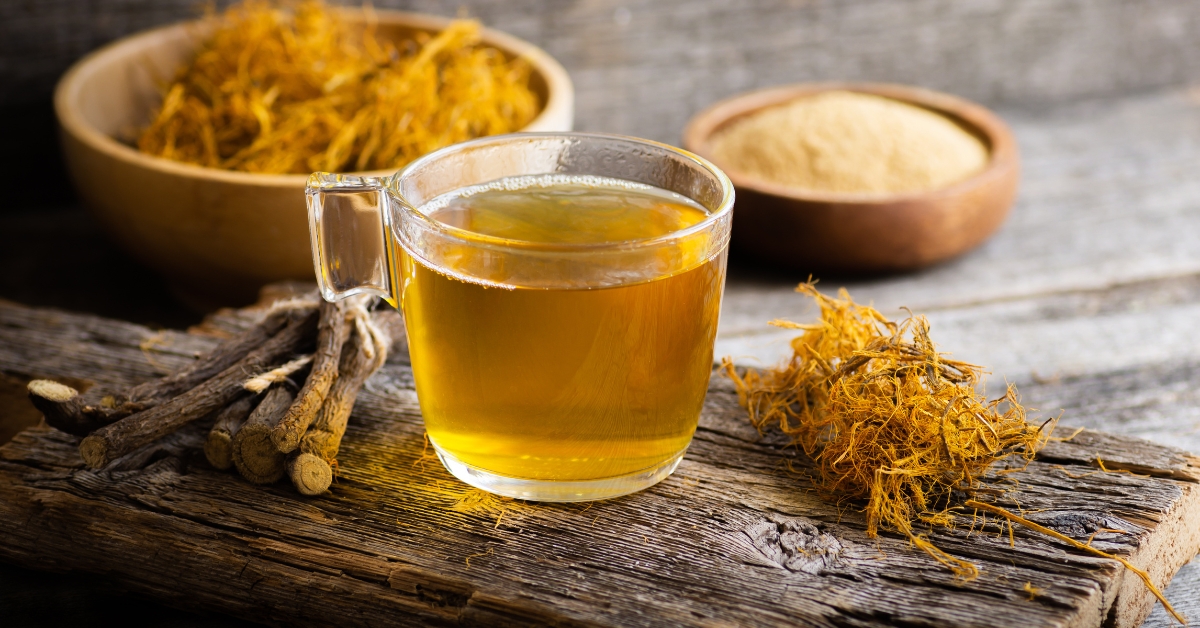
Bronchial Soothing Tincture
Ingredients:
- 2 parts dried licorice root
- 1 part dried black seeds
- 1 part dried ginger root
- 1 part dried peppermint leaves
- 80-proof vodka or vegetable glycerin
Preparation:
- Fill a jar 1/3 full with the herb mixture.
- Cover with vodka or glycerin. Seal and store in a dark place for 4-6 weeks, shaking daily.
- Strain and take 30-60 drops in water, 2-3 times daily to support bronchial health.
- Licorice root may raise blood pressure if used long-term or in high doses.
- Peppermint may worsen acid reflux, which can trigger asthma symptoms in some individuals.

Potent Asthma Relief Blend
Ingredients:
- 1 teaspoon ground black seeds
- 1 teaspoon dried licorice root
- 1 teaspoon dried turmeric root
- ½ teaspoon dried ginger root
- ½ teaspoon dried peppermint leaves
- 1 cup of boiling water
Preparation:
- Mix all herbs in a teapot.
- Add boiling water and steep for 15-20 minutes.
- Strain and drink once daily to potentially reduce asthma symptoms and support overall respiratory health.
- Licorice root may raise blood pressure if used long-term or in high doses.
- Peppermint may worsen acid reflux, which can trigger asthma symptoms in some individuals.
These herbal recipes are designed to be easily integrated into daily routines, providing a practical approach to supporting asthma management naturally. Adjust the blends according to personal preference and tolerance. Remember to use these herbal remedies as part of a comprehensive asthma management plan under the guidance of a healthcare professional.
☯️ Integrating Herbs into Daily Life for Asthma Support
Incorporating herbs into your daily routine may help manage asthma symptoms and support overall respiratory health. Here are some practical tips for using herbs effectively and complementary practices, to maximize their benefits.
Daily Use and Lifestyle Integration
- 🫖 Herbal Teas: Start your day with a cup of herbal tea containing ingredients like ginger or peppermint. Consider having another cup in the evening to support nighttime breathing.
- 💚 Herbal Supplements: If you prefer not to drink herbal teas, consider taking herbs like turmeric or ginger in capsule form. These can be easily incorporated into your daily routine. Always follow recommended dosages and consult with a healthcare provider before starting new supplements, especially if you have asthma.
- 🍃 Herbal Inhalations: Create a steam inhalation using peppermint leaves. This can be particularly helpful during asthma flare-ups or when you feel congested. However, it may worsen acid reflux, which can trigger asthma symptoms in some individuals.
Additional Practices to Support Respiratory Health
- 🥦 Dietary Adjustments: Incorporate anti-inflammatory foods into your diet, such as leafy greens, fatty fish, garlic and berries. These foods may help reduce overall inflammation and support respiratory health.
- 🏃♀️ Regular Exercise: Engage in moderate exercise like walking or swimming to improve lung function. Always warm up properly and have your rescue inhaler on hand. Consult your healthcare provider before starting a new exercise routine, as exercise-induced asthma is a concern for some individuals.
- 🧘♀️ Stress Management: Practice relaxation techniques such as deep breathing exercises or meditation. Stress can trigger asthma symptoms, so managing it is crucial for overall respiratory health. Deep breathing exercises, in particular, may help reduce feelings of breathlessness.
- ✨ Air Quality: Use an air purifier in your home and avoid exposure to known asthma triggers like smoke or strong odors. Improving indoor air quality is a crucial step in managing asthma symptoms.
- 🫗 Hydration: Stay well-hydrated to help keep your airways clear. Hydration may help thin mucus, making it easier to breathe. Herbal teas can contribute to your daily fluid intake.
Remember to start with small amounts of any new herb to see how your body reacts. These herbs and practices are meant to complement, not replace, your prescribed asthma treatments. Always consult your healthcare provider before making changes to your asthma management plan.
🌱 Navigating Herbs Safely
Starting with small doses is the first step when adding herbal remedies to your health routine. This approach lets you see how you respond and adjust amounts for the best effect, keeping safety in mind. While many herbs are safe, everyone’s body reacts differently. If you notice any side effects, it’s important to stop and think about what might be causing them.
Remember, herbs can sometimes interact with prescription medicines. These interactions might make your medicines work too well or not well enough, which is why talking to a healthcare provider or an herbalist is essential. This is especially crucial if you’re pregnant, breastfeeding, taking medications regularly, or have an existing health condition. Getting advice tailored to your situation can help you avoid any unnecessary risks.
For kids and older adults, being extra careful with herbs is important. Their bodies might react more strongly to herbal remedies, and the chance of side effects or interactions could be greater. Before giving herbal treatments to children or elderly family members, getting advice from a professional is a must to ensure their safety.
By being cautious and seeking expert advice when needed, you can make herbal remedies a safe part of your wellness plan. This careful approach allows you to enjoy the benefits of herbs while keeping yourself and your family safe.
We explored the potential benefits of herbal remedies for asthma management. We discussed several herbs traditionally used to support respiratory health, including black seed, licorice, turmeric, ginger, and peppermint. Each herb has its potential effects on asthma symptoms, such as reducing inflammation, easing breathing, and improving lung function.
There are several herbal tea and tincture recipes for asthma management. These blends aim to ease breathing, reduce inflammation, and provide natural relief for asthma symptoms. However, we emphasized that these herbal remedies should complement, not replace, conventional asthma treatments.
Practical tips for incorporating herbs into daily routines include using herbal teas, supplements, and inhalations. We suggest complementary practices like dietary adjustments, regular exercise, stress management, and maintaining good air quality to support overall respiratory health.
It’s important to note that while some studies suggest potential benefits, more research is needed to fully establish the efficacy and safety of these herbal remedies for asthma.
FAQ
Are herbs a safe alternative to conventional asthma medications?
Herbs can be a helpful complement to conventional asthma treatments, but they are not a safe alternative to replace prescribed medications. While some herbs like black seed, turmeric, and ginger have shown potential benefits for asthma symptoms, the scientific evidence supporting their use is limited compared to conventional asthma medications, which have undergone rigorous clinical testing. Herbs may help reduce inflammation, ease breathing, and support overall respiratory health. Still, they should not be relied upon as the sole treatment for asthma, especially for moderate to severe cases. Working with your healthcare provider to develop a comprehensive asthma management plan that may include herbs as a complementary therapy is crucial. Stopping prescribed asthma medications suddenly in favor of herbal remedies can be dangerous and may lead to severe asthma attacks. Always consult your doctor before incorporating herbs into your asthma treatment regimen, as some herbs can interact with medications or cause side effects.
How long does it take to see results from using herbs for asthma?
The time it takes to see results from using herbs for asthma can vary significantly depending on the individual, the severity of asthma, and the specific herbs used. Some people may notice mild improvements in their symptoms within a few days to a week of consistent use, while others may need several weeks or even months to experience noticeable benefits. However, it is essential to understand that the effectiveness of herbs for asthma is not well-supported by strong clinical evidence, and individual responses may vary greatly. For example, turmeric and ginger may provide some benefit over time due to their anti-inflammatory properties, but there is limited evidence suggesting that they offer immediate relief. Herbs like black seed might require longer-term use to see potential effects, as current research mostly points to small improvements in respiratory health when used regularly over time. It's important to be patient and consistent with herbal treatments, as their effects are often cumulative. However, herbs work differently than conventional medications and are unlikely to provide the rapid relief that rescue inhalers offer during acute asthma attacks. Always monitor your symptoms closely and continue using your prescribed medications as directed by your healthcare provider while incorporating herbs into your routine.
Can children with asthma safely use herbal remedies?
While some herbal remedies may offer benefits for children with asthma, it's crucial to approach their use with extra caution. Children metabolize substances differently than adults, and they may be more sensitive to the effects of herbs. Some herbs that are generally safe for adults may not be appropriate for children. For instance, licorice root should be used very cautiously in children due to its potential effects on hormones and the risk of raising blood pressure. While often safe, peppermint can cause breathing difficulties (laryngospasm) in very young children and should be used in smaller doses and with caution. Before giving any herbal remedies to a child with asthma, it's essential to consult with a pediatrician or a healthcare provider knowledgeable in herbal medicine to ensure safety. They can provide guidance on appropriate herbs, safe dosages, and potential interactions with other medications. Even herbs that seem mild can sometimes cause side effects or interfere with conventional treatments. It’s critical to remember that herbal remedies should never replace a child's prescribed asthma medications or management plan. Instead, they should be considered a potential complementary approach under close medical supervision. Monitor the child’s symptoms carefully, and discontinue any herb that causes adverse reactions.

